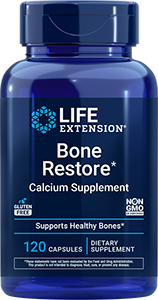
Should You Take Magnesium with Calcium?
Published: June 2025
Calcium and magnesium are like the dynamic duo of the mineral world: Think Batman and Robin, but for your bones, nerves and heart. They're both critical for helping your body run smoothly, and they often show up in supplements together for good reason.
Calcium and magnesium are essential minerals, meaning your body needs them and cannot produce them (or produce them in sufficient amounts). So they need to be obtained from the foods we eat or from daily supplements. And they work together behind the scenes to keep your body moving.
If I were to give calcium a nickname, it would be "the bone builder." It helps keep your skeleton strong and healthy. Magnesium, on the other hand, would be "the multitasker." It is involved in many processes within the body, such as helping muscles to relax and supporting nerve function, and it plays a role in how your body uses energy.
Before you look to add these minerals to your daily routine, it's important to understand how they interact, what happens when you take them together, and how to do it in a way that supports your body.
What are magnesium and calcium—and why do they matter?
Imagine your body like a bustling city. Calcium is the structure (like beams and columns) holding up the buildings. It gives support and strength to your teeth and bones. In that city, your bones are similar to a bank: Most of your calcium is stored within your bones, and it is constantly being deposited and withdrawn when needed.
In addition to structure, calcium plays an important role in helping your heart beat, your muscles contract, and overall cardiovascular health. Think of it like the traffic controller for your body's movement and rhythm.
Meanwhile, magnesium is more like the electrician, making sure signals are firing, lights are on, and things are running smoothly behind the scenes. Magnesium is involved in 300-600 chemical reactions and plays a role in various functions, including metabolism, brain health, bone health, cardiovascular health, and more. It is a mineral that wears many hats!
How do magnesium and calcium work together in the body?
Despite their different roles, these two minerals often work side by side. For example, calcium tells your muscles when to contract, while magnesium helps your muscles to relax.
Remember, calcium is the builder in the city, laying down strong bones and helping your muscles work. Magnesium is the calm, collected project manager, making sure everything runs smoothly.
Calcium and magnesium complement each other in many ways. Magnesium helps activate vitamin D, and vitamin D helps your body absorb calcium properly. So even if you're getting plenty of calcium, it may not do much good without enough magnesium and vitamin D in the mix. Just like Batman and Robin, calcium (Batman) usually gets all the credit for building strong bones, but magnesium (Robin) plays a big supporting role in keeping your bones strong and healthy.
Calcium and magnesium also pair up to support your muscles and nervous system. Magnesium helps "wake up" nerves and keep signals flowing, while calcium is needed to fire neurotransmitters. In other words, magnesium sets the stage, and calcium delivers the message.
Benefits of taking magnesium with calcium
Research shows calcium and magnesium support many aspects of health:
Bone health:
Calcium and magnesium are best known as a team for strong bones, helping to build and maintain bone tissue, and magnesium plays a significant role in your body's calcium absorption.Brain health:
Both calcium and magnesium support your nervous system, but magnesium has extra benefits for your brain. One form, magnesium L-threonate, has been studied to support cognitive and executive function in a randomized placebo-controlled trial. It also supports memory.Cardiovascular health:
In your heart, both of these minerals are responsible for a steady rhythm. Calcium is needed to spark your heartbeat, while magnesium helps your heart maintain a healthy beat.Stress management: Calcium and magnesium both help maintain already-healthy blood pressure, and some forms of magnesium have been shown to help the mind relax and encourage feelings of calmness. Magnesium can also promote restful sleep.
Who should consider calcium-magnesium supplements?
I'm a big believer in a food-first approach to nutrition. Remember, supplements should supplement an already nutritious diet. However, supplementation can be beneficial for many people.
Studies show most people don't get enough magnesium on a daily basis, and food preferences may affect your intake, especially when it comes to calcium and magnesium. Magnesium is found in whole grains and green leafy vegetables, and more than 80% of Americans consume below the recommendation for both. This may be especially true for many who prioritize protein. Calcium is abundant in dairy products, but some people dislike dairy, or they follow vegan or vegetarian diets.
Vitamin D is another vitamin many people do not get enough of, even though our bodies make vitamin D when skin is exposed to sunlight.
For these reasons, supplements can be a great way for people of all ages to meet their body's needs outside of food. But taking a calcium supplement, a magnesium supplement, or a combination supplement can be especially important in certain circumstances:
Postmenopausal women or adults of 65:
Our bodies change with time and with hormonal changes such as menopause. These changes affect bone density as well as many other nutrient levels. Consuming enough calcium and magnesium through food or a calcium supplement/magnesium supplement can support healthy, strong bones.Lab testing:
Regular lab testing can give you an excellent picture of your health, and may indicate the need to supplement with specific vitamins and minerals.Low intake of magnesium- or calcium-rich foods:
If you have a low dietary intake of dairy, leafy greens, whole grains, nuts or seeds, you may not be getting enough magnesium or calcium through food. About 90% of the U.S. population does not meet dairy recommendations or the recommendations for vegetables, and 98% fall below the recommendations for whole grains. Supplements can help you reach optimal intake levels.
Explore Our Best Magnesium Supplements
When and how to take magnesium and calcium
A combination supplement with both magnesium and calcium may offer the best support for your bone and heart health. Combination supplements that include this dynamic duo, as well as vitamin D, support healthy bone maintenance and cardiovascular function.
As with any supplement, it is best to take your calcium supplement or magnesium supplement according to the product label. You may have heard that magnesium and calcium can compete for absorption, but this only happens at very high doses of calcium, about 2600 mg.
Most product labels recommend taking calcium supplements with food in divided doses to help your body better absorb it and promote digestive comfort. When taking supplements or making a lifestyle change, always speak with a doctor or healthcare provider first.
How to choose the right supplement combination
There are many calcium supplements and magnesium supplements, but they don't all work the same. Keep these things in mind when choosing nutritional supplements.
Look for a calcium-magnesium combination:
Combination supplements can help optimize your intake of each of these minerals in fewer capsules.Avoid large doses:
In most cases, more isn't always better. When taking supplements, including calcium supplements, always follow the instructions on the product label or the advice of your healthcare provider.High-quality brands:
Look for companies that can provide certificates of analysis for their products, are third-party tested, and have full disclosure labels. (They don't just state "calcium," but have the source of the calcium.)
Looking for the right supplement combination for your bone health? Our health needs quiz can give you a personalized recommendation on the nutrients that fit your concerns and lifestyle.
About the Author: Mike Shea, RD, is a registered dietitian, coach, and founder of The Busy Parents Dietitian. With years of experience and a compassionate, results-driven approach, Mike specializes in helping parents transform their nutrition, build confidence, and regain energy in their busy lives. As a parent of two young girls, Mike understands the demands of family life and the unique challenges that come with prioritizing personal health.
Instagram: @thebusyparentsdietitian.
References
- Chen R, et al. "Total, dietary, and supplemental calcium intake and risk of all-cause, cardiovascular, and cancer mortality among U.S. adults: a prospective cohort study from the National Health and Nutrition Examination Survey." Arch Osteoporos. November 2024. https://pubmed.ncbi.nlm.nih.gov/39528775/
- Cormick G, Belizán JM. "Calcium Intake and Health." Nutrients. July 2019. https://pubmed.ncbi.nlm.nih.gov/31311164/
- de Baaij JH, et al. "Magnesium in man: implications for health and disease." Physiol Rev. January 2015. https://pubmed.ncbi.nlm.nih.gov/25540137/
- Fatima G, et al. "Magnesium Matters: A Comprehensive Review of Its Vital Role in Health and Diseases." Cureus. October 2024. https://pubmed.ncbi.nlm.nih.gov/39539878/
- Groenendijk I, et al. "Impact of magnesium on bone health in older adults: A systematic review and meta-analysis." Bone. January 2022. https://pubmed.ncbi.nlm.nih.gov/34666201/
- Liu Y, et al. "The effect of calcium supplementation in people under 35 years old: A systematic review and meta-analysis of randomized controlled trials." Elife. September 2022. https://pubmed.ncbi.nlm.nih.gov/36164828/
- Maier JAM, et al. "Magnesium and the Brain: A Focus on Neuroinflammation and Neurodegeneration." Int J Mol Sci. December 2022. https://pubmed.ncbi.nlm.nih.gov/36613667/
- Nielsen FH. "The Role of Dietary Magnesium in Cardiovascular Disease." Nutrients. December 2024. https://pubmed.ncbi.nlm.nih.gov/39683617/
- Pikor D, et al. "Calcium Ions in the Physiology and Pathology of the Central Nervous System." Int J Mol Sci. December 2024. https://pubmed.ncbi.nlm.nih.gov/39684844/
- Razzaque MS, Wimalawansa SJ. "Minerals and Human Health: From Deficiency to Toxicity." Nutrients. January 2025. https://pubmed.ncbi.nlm.nih.gov/39940312/
- "Calcium." National Institutes of Health. July 2024. https://ods.od.nih.gov/factsheets/Calcium-HealthProfessional/
- Dietary Guidelines for Americans, 2020-2025. https://www.dietaryguidelines.gov/sites/default/files/2020-12/Dietary_Guidelines_for_Americans_2020-2025.pdf
- "Magnesium." National Institutes of Health. June 2022. https://ods.od.nih.gov/factsheets/Magnesium-HealthProfessional/
Always be in the know!
Access the latest deals, wellness news, expert health tips & more!












